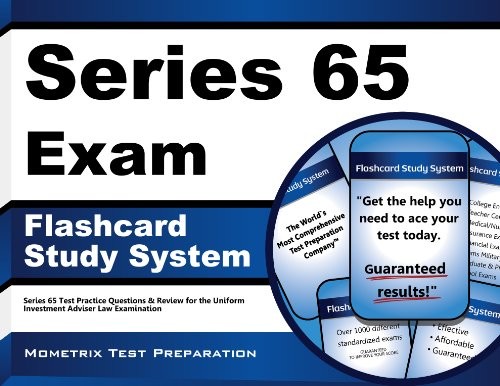Series 65 Uniform Investment Adviser Law Examination
Post on: 16 Март, 2015 No Comment

Uniform Investment Adviser Law Examination
You can opt-out at any time.
Series 65 Overview: The Series 65 exam is also known as the Uniform Investment Adviser Law Examination. It is designed to qualify someone to work as an investment advisor representative (that is, someone who works as an agent for an investment advisory firm). It is required by most states, as evidence that the candidate is familiar with state securities laws and regulations.
Definition of Investment Advisor Representative: According to the Uniform Securities Act, an investment advisor representative is someone employed by or associated with an investment advisory firm who does any of the following:
- Makes recommendations or gives investment advice
- Manages client accounts or portfolios
- Determines which recommendations or advice regarding securities should be given
- Provides investment advice or holds herself or himself out as providing investment advice
- Receives compensation to solicit, offer or negotiate for the sale of or for selling investment advice
- Supervises employees who perform any of the above tasks
On the other hand, an investment advisor is not someone who:
- Performs only clerical or ministerial acts
- Whose involvement in formulating or offering investment advice is incidental, and who does not receive special compensation for investment advisory services
Investment advisory firms registered with the SEC and people employed by or associated with the are exempt from separate state registration, licensing or qualification, except for investment advisor representatives whose actual places of business is within a given state.
Exemptions: Holders of several professional designations, most notably the CFA and the CFP. are considered to have proven mastery of the same material already, and thus are exempt in most states from taking the Series 65 exam. Other such designations include the Personal Financial Specialist (PFS), Chartered Financial Consultant (ChFC) and Chartered Investment Counselor (CIC) credentials.
Length of the Exam: The Series 65 consists of 140 multiple choice questions and 180 minutes are allotted for completing the test. Only 130 of the questions in the exam are actually counted towards the candidate’s final score. Each test includes 10 experimental questions being considered for use in future versions of the exam. They are distributed throughout the exam, and the test taker is unaware of which ones they are.
Passing Score: The Series 65 exam tests minimum competency, and a passing score is 94 correct answers, or 72% of the 130 questions that count towards the final score. A candidate who fails the Series 65 exam must wait at least 30 days before taking it again. The same rule applies to someone who has failed a second time and who wishes to take it a third time. After a third failure, a candidate must wait at least 180 days before taking the exam again. This same rule applies to all subsequent failed attempts.
Topics Covered: The Series 65 exam, like the Series 63. covers the Uniform Securities Act, the registration of financial professionals and securities under that act, and professional ethics. However, it also covers topics that are more germane to the Series 7. though in less detail. These topics include economics, the securities markets, investments, investment strategies, financial analysis and professional ethics.
Who Takes It: Accordingly, the Series 65 exam tends to be taken by people who have not taken the Series 7, and who are thus not qualified as General Securities Representatives. An example of the type of person taking the Series 65 would be a CPA who seeks to offer investment advice in return for a fee.
Getting Registered and Licensed: There are several caveats related to passing the Series 65 exam. First, the candidate is still responsible for knowing and adhering to the specific requirements of the securities laws and regulations of the states in which he will conduct business. Second, while passing the exam often is a key prerequisite to being licensed to do business in a particular state, it is not necessarily the only one, and never confers an automatic right to be licensed or registered in a given state. Nevertheless, the NASAA firmly believes that the Uniform Investment Adviser Law Examination makes for better state securities regulation and better protection of the investing public by promoting uniformity in such regulation and in the qualification standards for financial professionals.














